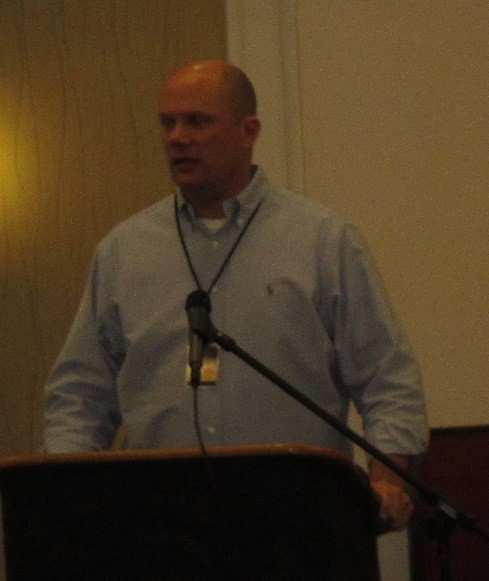The developments of earlier this week have highlighted the ongoing unraveling of what once “United” the Methodist Church.
It is therefore timely to recall a gathering I was privileged to attend earlier this year of United Methodist leaders seeking a new, different, faithful, and positive conversation for members of our troubled denomination.
At this critical time in our denomination’s history, faithful United Methodists are coming together to constructively offer each other ministry resourcing, covenant accountability, and promotion of historic Methodist theology and spirituality.
Over 125 United Methodist clergy and laity gathered outside of Atlanta, Georgia for the first, two-day public meeting of the new Wesleyan Covenant Network (WCN).
WCN developed out of discussions in the aftermath of the 2012 General Conference between four United Methodist ministers: Bryan Collier, Allen Newton, Shane Stanford, and Maxie Dunnam. Collier, chair of the WCN leadership team, is founding pastor of The Orchard, a multi-site United Methodist congregation in Tupelo, Mississippi. Newton pastors the large St. James UMC in Montgomery, Alabama. Stanford pastors the 5,400-member Christ UMC in Memphis. Dunnam is Pastor Emeritus of Christ UMC, former President of Asbury Seminary, and former world editor of the UMC’s “The Upper Room” devotionals, among many other things.
Greetings were brought on behalf of Bishop Mike Watson of the North Georgia, who had originally planned to attend.
Rev. Chappell Temple, senior pastor of the 3,500-member Lakewood UMC in Houston, Texas, explained the value of clergy being a part of a covenant order. “We don’t like monastic orders because we like to be married and we like money,” he observed. But those in United Methodist clergy orders have already committed to God and the church to teach the church’s core doctrine, live according to early Methodism’s “General Rules,” and uphold the UMC’s Book of Discipline. Our problem is that the Book of Discipline has for many become “The Book of Feeble Suggestions which May or May Not Work for You,” Temple quipped.
While the Discipline “is not devotional reading,” the mega-church pastor challenged negatively viewing it as just “a book of legalistic restrictions.” Rather, the Discipline “expresses the mutual heartfelt covenant we have one with the other,” reflects clergy’s commitment to “being intentional about keeping in covenant with those who have agreed to this with me,” and is a concrete means for heeding Wesley’s exhortation to “watch over one another in love.”
This gathering came at a dramatic point in our denomination’s history, thanks to the “biblical [dis]obedience” movement of renegade UMC clergy performing same-sex blessings in open defiance of the biblical Discipline policies they chose to vow to uphold. Especially on participants’ minds was retired Bishop Mel Talbert of San Francisco invading a new, active bishop’s territory to perform a publicity-stunt same-sex union ceremony, rudely disregarding the public protests of his colleague bishops.
Dunnam stressed that this gathering had been planned long earlier, and was not intended to be in response to Talbert. But he acknowledged, “I can’t imagine you didn’t come here without thinking of it.
Stating the obvious, Dunnam declared, “Schism has happened.” Talbert and his supporters “sealed that fact” by publicly declaring they are not willing to live in unity with a church that will not let them have their way. Charges brought against Talbert have to go through the radicalized Western Jurisdiction, which, Dunnam noted, amounts to asking the region’s radicalized leaders to hold Talbert accountable for doing what their 2012 jurisdictional conference resolution declared they wanted.
At the heart of our division, more than one speaker pointed out, was the authority of Scripture.
Dunnam outlined how this division developed a century ago with “Protestant liberalism diminishing classic orthodoxy,” especially in Methodist and mainline seminaries. He cited Dietrich Bonhoeffer’s observations of that bastion of mainline liberal Protestantism, Union Seminary in New York City: “There is no theology here.” The revered anti-Nazi theologian recalled how Union students “talked a blue streak, but are unfamiliar with the basic questions of the faith,” even laughing aloud at a public reading from Martin Luther on sin. Such a seminary culture, Bonhoeffer noted, “is accelerating the process of secularization of American Protestantism.” The recent displays of the disunity of American Methodism is us “reaping the harvest” of such liberal theology.
The anti-communal, accountability-rejecting, anti-biblical actions of Talbert and company have “strained to the breaking point” the unity of our denomination, “and it may break,” Dunnam observed.
However, the challenge of our current situation is that our de facto schism “is not formal,” which leaves “two churches in one denomination.”
Dunnam lamented how United Methodism has “used enforced loyalty through apportionments that have kept alive a structure which undermines the faith.” While he said he was not calling for withholding apportionments, he defended church members’ right to question how the apportionments have sometimes been misused to not advance the mission of God but rather “as an idol” and for “supporting things not worth supporting.”
Dunnam stressed that the orthodox wing of United Methodism “is not schismatic,” noting that he has “never know any conservative renewal groups advocating changing the fundamental nature of the church.” He rhetorically asked who are the ones violating the denomination’s communal covenant.
Speakers emphasized that WCN will not be another caucus group seeking structural reform of United Methodism, since “other groups are doing that quite effectively,” while WCN can attract a wider base of support.
It was also repeatedly stressed that in response to our denomination’s intensifying crisis, members of the church’s majority – who follow biblical teaching, seek to uphold the denomination’s effectively unchangeable Doctrinal Standards, and who have respectfully played by the rules – should not be the ones to leave.
So how do can biblically faithful United Methodists move forward in mission and ministry, beyond just fighting the same tiring battles?
The Wesleyan Covenant Network will be a vehicle for biblically grounded United Methodists to band together for in a covenant for missional networking, mutually edifying relationship-building, accountability, mentoring the next generation of leaders, growing and planting vital congregations, and sharing resources and best practices.
The WCN will demonstrate its commitment to the United Methodist Church by upholding the denomination’s Doctrinal Standards, pursuing the church’s mission, promoting spiritual disciplines, and prayer. These marks of denominational loyalty were contrasted to the priorities of paying homage to our bloated denominational structure’s institutional idolatries and “the hypocritical notion of ‘holy conferencing,’” which idolizes personal feelings over truth.
“The church by its very nature is charismatic,” Dunnam said, so we must stop thinking we can organize enough to accomplish God’s mission when in fact “[r]evival will only come by the will and the power of the Holy Spirit,” Who was recorded as moving in very dramatic ways in early Methodism.
Stanford presented the WCN as an opportunity to positively demonstrate what we “are running to” rather than “running from.” He also cited Wesley as clearly teaching that the mission to “save souls and build up the body,” which is the very “core of Methodism,” could not happen “unless we are in unity.”
The gathering presented many exciting, constructive things the WCN can offer, which have been rather demonstrably lacking in the mainstream of United Methodist life in the U.S. WCN can provide and spread clearer articulation of Methodism’s theological distinctives, since today, as one participant noted, “it would be a huge mistake to think that Methodists know what Methodists believe.”
Another major focus for WCN will be mentoring new generations of spiritual leaders. It was lamented how United Methodism’s liberal reputation and clumsily burdensome ordination process is causing us to lose many young people. After serving for 11 years on his conference’s board of ordained ministry, Newton concluded that “our present system is all about control … more interested in creating cogs in our machine rather than building runways for [young clergy-to-be] to take off from.” On a memorably personal note, the choked-up pastor recalled his own twenty-year-old son sharing that he felt “called of God to full-time Christian service,” but was not sure if it would be in the UMC. The WCN will offer new ways to invest in the lives of emerging new Christian leaders and model faithful, effective ministry for them.
Rev. Carolyn Moore reminded us of the urgency of the evangelical task before us with a vivid metaphor: “There are people in the world whose feet have been knocked out from under them, they are laying in danger, and they just want to be saved!” She also highlighted how evangelical United Methodism is a movement which affirms women in leadership, and more than merely tolerates female church planters.
Collier also stressed the importance of evangelizing our unchurched neighbors. He especially plugged the value of new churches in reaching new people for Christ. The church planter recalled an anecdote in which someone looking for a church in which even “misfits” could find a place was advised by another unchurched person, “go to The Orchard [Collier’s church], they’ll take anybody!”
We also learned about the good work being done by the WCN’s formal resourcing partners: Seedbed (Asbury Seminary’s print and online publishing arm), Wesleyan Accent (a Methodist ministry resourcing joint project of Seedbed and Stanford’s Christ UMC), and the New Expressions Network (a pan-Methodist evangelical church-planting initiative). Everyone at the gathering was given a copy of two Seedbed-published books: Thirty Questions: A Short Catechism on the Christian Faith by Asbury Seminary President Timothy Tennent and The Class Meeting: Reclaiming a Forgotten (and Essential) Small Group Experience by Kevin Watson of Seattle Pacific Seminary.
There was also discussion about the WCN eventually developing regional networks and a formalized covenant order.
Those interested in finding out more can go to www.wesleyancovenantnetwork.org





Comment by Chris Ellis on March 13, 2014 at 10:12 am
Why shouldn’t we withhold funding? Why send our money in to do the devil’s work?
Comment by Daniel on March 13, 2014 at 11:05 am
Chris is right. It’s all about money and power. This network, however well-intentioned, will come to nought. The liberal-progressive bureaucracy and bishops will stamp it out. Never underestimate the power of a bishop to give someone a lousy appointment as retribution and use appointments of liberal clergy to keep a congregation in line. I’ve seen it too many times to count.
Until UMC clergy and laity are willing to walk away from their buildings and property to form a new Methodist organization, no real change will happen. As shining examples I point to the Episcopal church and the the Presbyterian Church USA. No meaningful reform was possible inside these corrupt, increasingly heretical denominations. Likewise, no meaningful reform is possible within the UMC – absent a miracle from God.
Comment by Holly Boardman on March 13, 2014 at 12:03 pm
Thank you for this helpful article. As a single clergywoman however, I was struck by Rev. Temple’s statement, “We don’t like monastic orders because we like to be married and we like money.” I feel excluded by that. Shouldn’t there be a place in the Wesleyan movement for unmarried Christians who uphold the standard of “celibacy in singleness and faithfulness in marriage”? I certainly affirm that marriage is an honorable estate, but I also believe that the church should HONOR and AFFIRM that single adults are of value to the church. St. Paul commended and even preferred singleness. Shouldn’t the church (and the Wesleyan Covenant) make room for single Christians?
It is time for mature single, celibate Christians to come out of the closet. We need to be saying that sexual behavior is a CHOICE; and we need to claim a position of respect and honor in the church. Please don’t pity us, don’t exclude us, and don’t force us into the closet by telling us that marriage is the standard and the goal.
Comment by John Lomperis on March 13, 2014 at 12:12 pm
Thanks for your helpful and most-welcome reply. While I cannot claim to speak for Rev. Temple, I heard him as making a generalization, not seeking to exclude faithfully celibate brothers and sisters.
I agree that US evangelicalism has sometimes idolized marriage to the point of forgetting New Testament teaching that God calls some Christians to celibate singleness, with Paul even calling this route “even better” than marriage (1 Corinthians 7:38, NIV). In our own UMC history, we had quite the history of celibate single preachers, like Bishop Asbury.
On the other hand, voices like yours would be such a valuable contribution to the wider sexual morality debates that simply assume that God could not possibly want anyone in the world to have no marital companionship.
Comment by Holly Boardman on March 13, 2014 at 12:47 pm
John, all Christians are called to be celibate in singleness and faithful in marriage. This standard applies to engaged couples, and to widows and widowers–not only to people who are committed to life-long celibacy.
By the way, I also find it problematic that Rev. Temple states that we are fond of money. What is Christian about that statement?
Comment by gary on March 13, 2014 at 2:50 pm
Certainly pastors are fond of my money being put into the pew plates every Sunday. They sure do talk about it alot and devise ways to get you to put more in the plate. Without money you can’t function every well. Even Jesus and his disciples needed money – in fact that was what Judas Iscariot was in charge of right? So don’t cry foul to the pastor saying that he loved money.
Comment by Holly Boardman on March 13, 2014 at 4:25 pm
Needing money is one thing, being fond of money is another. Reforming the church will require a more attitude regarding money. God will provide for the NEEDS of those who seek God’s kingdom. John Wesley’s teaching on the use of money and wealth is helpful and instructive–and corrective.
Comment by Holly Boardman on March 13, 2014 at 4:26 pm
insert the word “Wesleyan” before the word “attitude” above.
Comment by John Morgan on March 19, 2014 at 9:49 pm
The idolatry of marriage and family at the expense of dismissing the celibate life is the biggest scourge on Protestant churches today and in my opinion accounts for the sexual immorality crisis we are facing today. Marriage can never be valued any more than celibacy. I too have been called to Apostle Paul’s lifestyle and, as a senior citizen today, have never felt welcome in any Protestant church. Sadly, Paul wouldn’t make it in the front doors today.
Comment by Roger on March 20, 2014 at 5:24 pm
The United Methodist Church is still one entity on paper and bound together under its polity system. The main question for those of the W.C.N., and others, would be is the UMC worthy to be redeemed or not? If the answer is yes, then all efforts to make a reconcilable plan for the two entities now in conflict, to separate equitably, be prepared and presented to our General Conference of 2016. Biblically, unless they are agreed,they can not stand or walk the road of life together; much less as a vital church. Many other concerned groups have sprung up in past years. Each solution has failed at reinvigorating the majority of our main church organization and they all started with the best of intentions. This continued course of partial separation and staying in the main body on paper is very unproductive and unsatisfying. A clean break made under our existing polity is the moral, spiritual, and ethical resolution to this challenge before us.